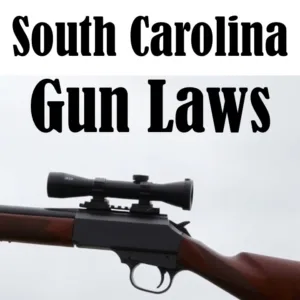South Carolina offers a blend of gun rights and regulations that gun owners need to understand. From concealed carry permits to where you can legally carry a firearm, the state’s laws outline specific guidelines to ensure both public safety and the rights of responsible gun owners. This guide will help you navigate South Carolina’s gun laws, including open carry, concealed carry, firearm purchases, restricted locations, and more.
South Carolina Gun Laws Overview

Open Carry in South Carolina
As of August 15, 2021, South Carolina permits open carry for individuals with a valid Concealed Weapons Permit (CWP). Unlike some states that allow open carry without a permit, South Carolina requires gun owners to have a concealed carry permit to openly carry a firearm. Open carry is allowed only for handguns and must be in a holster.
Concealed Carry in South Carolina
South Carolina is a shall-issue state for concealed carry permits, meaning that if you meet the eligibility requirements, the state must issue you a permit. The minimum age to obtain a Concealed Weapons Permit (CWP) is 21. While the open carry law was introduced, many gun owners still rely on concealed carry for personal protection.
How to Obtain a South Carolina CWP:
- Be at least 21 years old.
- Complete a state-approved firearms training course.
- Submit your application to the South Carolina Law Enforcement Division (SLED) with the necessary documents and fee.
- Pass a background check, which includes criminal history and mental health records.
- If approved, your permit will be issued within 90 days of submitting the application.
The CWP is valid for five years and can be renewed if you continue to meet the eligibility requirements.
Who Can Legally Own a Firearm in South Carolina?
To legally own a firearm in South Carolina, you must:
- Be at least 18 years old to possess or purchase a long gun (rifle or shotgun).
- Be at least 21 years old to purchase a handgun.
- Not have a felony conviction or be under indictment for a crime that could lead to imprisonment for more than one year.
- Not be mentally incompetent as determined by a court.
- Not be addicted to drugs or alcohol or subject to a restraining order related to domestic violence.
Purchasing a Firearm in South Carolina
South Carolina does not require a permit to purchase a firearm, and there is no waiting period for firearm purchases. However, federal law requires a background check for all purchases made through a licensed dealer.
Handgun and Long Gun Purchases
- Licensed Dealer Sales: All firearm purchases from licensed dealers require a background check conducted through the FBI’s National Instant Criminal Background Check System (NICS).
- Private Sales: Private firearm sales between individuals do not require a background check in South Carolina, though it is illegal to sell a firearm to someone who is prohibited from owning one.
Where Can You Carry a Gun in South Carolina?
South Carolina law restricts where firearms can be carried, even for individuals with a concealed weapons permit. Understanding these restrictions is essential to staying within the law.
- Schools: Firearms are prohibited on school property, including K-12 schools and school events, except for law enforcement officers.
- Government Buildings: Firearms are prohibited in government buildings such as courthouses, police stations, and other public offices. These locations are required to post signs indicating the prohibition.
- Private Property: Private property owners can ban firearms on their premises by posting clear signs. Ignoring these signs can lead to trespassing charges.
- Bars and Restaurants: You can carry a firearm in a restaurant that serves alcohol, but you are not allowed to consume alcohol while carrying. However, some businesses may post signs prohibiting firearms, and you must comply with these restrictions.
- Churches: Firearms are prohibited in churches or religious sanctuaries unless express permission is given by the governing body of the institution.
South Carolina’s Stand Your Ground and Castle Doctrine Laws
South Carolina has strong Stand Your Ground and Castle Doctrine laws that protect individuals who use force in self-defense situations.
Stand Your Ground
South Carolina’s Stand Your Ground law allows individuals to use deadly force in self-defense without the duty to retreat if they are in a place they have the legal right to be and are not engaged in illegal activity. This law applies to public spaces, allowing for the defense of oneself or others when faced with imminent danger.
Castle Doctrine
The Castle Doctrine in South Carolina allows individuals to use deadly force in self-defense when in their home, vehicle, or business. The law assumes that anyone who unlawfully enters these spaces poses a threat, allowing the use of force without the need to retreat. South Carolina’s Castle Doctrine is particularly strong, extending to occupied vehicles.
Restrictions on Firearms in South Carolina
While South Carolina offers broad gun rights, there are still important restrictions on who can possess a firearm and what types of firearms are allowed.
- Convicted Felons: Felons are prohibited from owning or possessing firearms unless their rights have been restored through a pardon.
- Domestic Violence Offenders: Individuals convicted of domestic violence or subject to a restraining order for domestic violence cannot possess firearms.
- Mentally Ill Individuals: Anyone who has been adjudicated as mentally incompetent or committed to a mental institution is prohibited from owning firearms.
- Machine Guns and NFA Firearms: Fully automatic weapons, short-barreled rifles, and silencers are allowed in South Carolina but must comply with federal laws, including registration with the Bureau of Alcohol, Tobacco, Firearms, and Explosives (ATF).
Reciprocity with Other States
South Carolina has reciprocity agreements with many states, meaning that a South Carolina Concealed Weapons Permit is honored in other states. Likewise, South Carolina recognizes the concealed carry permits of other states, but only if those states meet South Carolina’s reciprocity standards.
It is important to check the specific laws of any state you plan to visit to ensure you comply with their regulations on carrying firearms.
Penalties for Violating Gun Laws in South Carolina
Violating gun laws in South Carolina can lead to serious consequences, including fines, imprisonment, and loss of gun rights. Common violations include:
- Carrying Without a Permit: Carrying a concealed weapon without a valid permit can lead to misdemeanor or felony charges, depending on the circumstances.
- Carrying in a Prohibited Area: Carrying a firearm in a location where it is prohibited, such as a school or government building, can result in criminal charges and fines.
- Possession by a Prohibited Person: Individuals who are prohibited from owning firearms, such as felons or domestic violence offenders, can face felony charges if found in possession of a firearm.
Conclusion: Understanding South Carolina Gun Laws
South Carolina’s gun laws provide significant freedoms for gun owners, especially with recent changes to allow open carry for concealed weapons permit holders. However, it is crucial to be aware of where firearms can be carried and who is eligible to own them.
Even though South Carolina permits open carry with a CWP, many people still choose to obtain a concealed weapons permit for added legal protection and reciprocity when traveling to other states. Understanding both state and federal firearm laws ensures that you can safely and legally exercise your Second Amendment rights.
FAQs About Gun Laws in South Carolina
1. Is open carry legal in South Carolina?
Yes, open carry is legal for individuals who have a valid South Carolina Concealed Weapons Permit (CWP) as of August 15, 2021.
2. Do I need a permit to carry a concealed handgun in South Carolina?
Yes, South Carolina requires a permit to carry a concealed handgun. You must meet the eligibility requirements and complete the necessary training to obtain a Concealed Weapons Permit.
3. Can I carry a firearm in my vehicle in South Carolina?
Yes, South Carolina allows the legal carrying of a firearm in a vehicle without a CWP, but the firearm must be secured in a closed compartment, such as a glove box or center console.
4. Are background checks required for private firearm sales in South Carolina?
No, South Carolina does not require background checks for private firearm sales. However, it is illegal to sell a firearm to someone you know is prohibited from owning one.
5. What happens if I carry a firearm in a prohibited area?
Carrying a firearm in a prohibited area, such as a school or government building, can lead to criminal charges and fines. It’s important to know where firearms are banned to avoid penalties.
